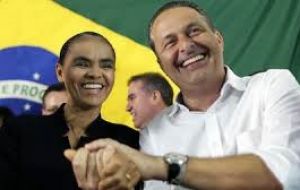MercoPress. South Atlantic News Agency
Last minute decision saved Marina Silva from travelling with Campos
 Marina's conservationist advocacy has earned the wrath of Brazil’s agribusiness, but she also appeals to conservative voters with her defense of family values
Marina's conservationist advocacy has earned the wrath of Brazil’s agribusiness, but she also appeals to conservative voters with her defense of family values Environmental activist and politician Marina Silva could have been on the plane that crashed on Wednesday and killed presidential candidate Eduardo Campos and six other occupants.
The two of them had been together in Rio de Janeiro, where Campos had been interviewed on the Globo television network, and he had offered her a ride to Guarajá. But, at the last minute, Silva decided to go straight to the Sao Paulo airport of Guarulhos instead, aboard a commercial flight.
The decision will shape her future for years to come. Silva — who until Wednesday was running as Campos’ running-mate — will now have to decide if she is ready to take his place and represent the Brazilian Socialist Party’s (PSB) presidential aspirations.
Under Brazilian law, the PSB has 10 days to decide on a candidate.
The daughter of illiterate rubber-tappers, Silva grew up in the rainforest and learned to read as a teenager. Orphaned at 16, she moved from the Bagaço rubber tree plantation to the capital of the western state of Acre, Rio Branco, where she worked as a maid.
She eventually made it to university, where she became politically active, and graduated at 26. At 36, she became Brazil’s youngest senator. In 2003, then-president Lula da Silva picked her as his Environment minister, a position she used to fight against deforestation.
But ideological differences eventually led her to break with the Workers’ Party (PT) and join the Green Party. In the 2010 presidential election, she ran on an environmental platform and came third with a surprising 19.3% of votes, the equivalent to 20 million voters.
An evangelical with a feisty campaign style, Silva is an unconventional figure in Brazilian politics. Her conservationist advocacy has earned the wrath of Brazil’s powerful agribusiness sector, yet Silva can appeal to conservative voters with her defense of family values and opposition to abortion.
Last year, as massive protests hit the country’s political establishment, polls revealed she was the only political figure still trusted by voters. As President Dilma Rousseff dipped in polls, Marina — as she is known to Brazilians — kept rising.
After failing to register her own political party on time for this year’s electoral campaign, an alliance with Campos became her only option, even though she had a political identity of her own and greater name recognition than her running-mate. She also had more supporters, which made her a particularly appealing vice-presidential candidate.
A visibly shaken Silva spoke to reporters in Santos following the plane crash on Wednesday. In her brief remarks, she focused on her relationship with Campos.
“During these 10 months of partnership, I learned to respect him, admire him and feel confidence in his attitudes and his ideals in life,” Silva said in a soft, wavering voice. “He had a commitment to making Brazil a better country,” she said.





Top Comments
Disclaimer & comment rulesCommenting for this story is now closed.
If you have a Facebook account, become a fan and comment on our Facebook Page!